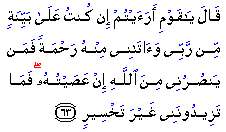Living The Quran
From Issue: 469 [Read full issue]
Hud
Chapter 11: Verse 63
 Intrinsic Impossibility
Intrinsic Impossibility
He (Salih) replied, "O my people! do ye see? if I have a Clear (Sign) from my Lord and He hath sent Mercy unto me from Himself, who then can help me against Allah if I were to disobey Him? What then would ye add to my (portion) but perdition?"
Although this dialogue is related in the context of the story of Salih (peace be upon him) and the leaders of the Thamud, its implications have - as is always the case with Quranic stories and parables - a universal, timeless import. The stress here is on the intrinsic impossibility of reconciling belief in the One God with an attribution of divine or semi-divine qualities and functions to anyone or anything else. The subtly-veiled suggestion of the Thamud and its rejection by Salih has a bearing on all religious attitudes based on a desire to "bring God closer to man" through the interpretation of alleged "mediators" between Him and man.
In primitive religion, this interposition led to the deification of various forces of nature and, subsequently, to the invention of imaginary deities which were thought to act against the background of an undefined, dimly-perceived Supreme Power (for instance, the Moira of the ancient Greeks). In higher religious concepts, this need for mediation assumes the form of personified manifestations of God through subordinate deities (as is the case, in Hindus, with personification of the Absolute Brahma of the Upanishads and the Vedanta in the forms of Vishnu or Shiva), or in His supposed incarnation in human form (as represented in the Christian idea of Jesus as "God's son" and the Second Person of the Trinity). And, lastly, God is supposedly "brought closer to man" by interposition of hierarchy of saints, living or dead, whose intercession is sought even by people who consider themselves to be "monotheists" - and this includes many misguided Muslims who do not realize that their belief in saints as "mediators" between man and God conflicts with the very essence of Islam.
The ever-recurring Quranic stess on the oneness and uniqueness of God, and the categorical denial of the idea that anyone or anything - whether it be a concrete being or an abstract force - could have the least share in God's qualities or the least influence on the manner in which He governs the universe aims at freeing man from the self-imposed servitude to an imaginary hierarchy of "mediating power", and at making him realize that "wherever you turn, there is God's countenance", and that God is "always near to the call of whosoever calls unto Him."
Source:
"The Message of the Quran" - Muhammad Asad